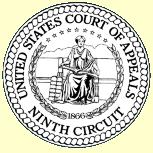|
 The
VigilanceVoice The
VigilanceVoice
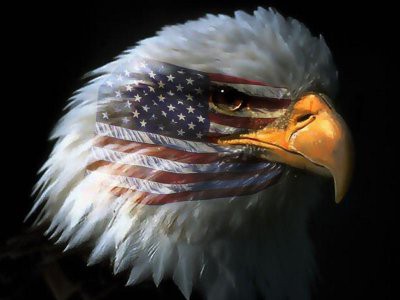
VigilanceVoice.com
Thursday--June 27, 2002—Ground
Zero Plus 288
"One Nation, Under Vigilance, With Liberty And Justice For
All..."
by
Cliff McKenzie
Editor, New York City Combat Correspondent News
GROUND ZERO, New York City, June 27--Terrorism attacks again, this
time it takes a bite out of the Pledge of Allegiance.
The United States Court of Appeals for the Ninth
Circuit, whose jurisdiction includes Alaska, Arizona, California, Hawaii,
Idaho, Montana, Nevada, Oregon and Washington, ruled the Pledge could not
be recited in schools because it violates the First Amendment's
prohibition against a state endorsement of religion.
Specifically, the lawsuit was launched by
atheist, Michael A. Newdow, whose daughter attended elementary school in
Elk Grove Unified School District near Sacramento, California, the state's
capital The affronted father claimed his
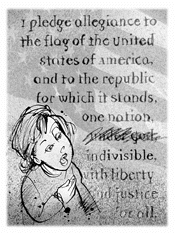 |
daughter was forced to "watch and listen as her state-employed
teacher in her state-run school leads her classmates in a ritual
proclaiming that there is a God, and ours is 'one nation under God.'"
Back in 1943, before the 1954 inclusion of
the words "one nation under God" by Congress into the Pledge of
Allegiance, the Supreme Court ruled that children cannot be forced to
recite the pledge. At that time, there was no question of religion
on the table, just one of free speech.
Framework for the Court's opinion is the
Establishment Clause of the Bill of Rights, contained in the First
Amendment which says:
| Amendment I
- Freedom of Religion, Press, Expression.
Ratified
12/15/1791. Congress shall make no law
respecting an establishment of religion, or prohibiting the free
exercise thereof; or abridging the freedom of speech, or of the
press; or the right of the people peaceably to assemble, and to
petition the Government for a
redress of grievances.
http://www.usconstitution.net/const.html#Am1 |
For reference, the U.S. Congress did not
recognize the Pledge officially until 1942. It was originally
published for Columbus Day, on September 8, 1892, in the Boston magazine
The Youth's Companion. A staff writer, Francis Bellamy, drafted
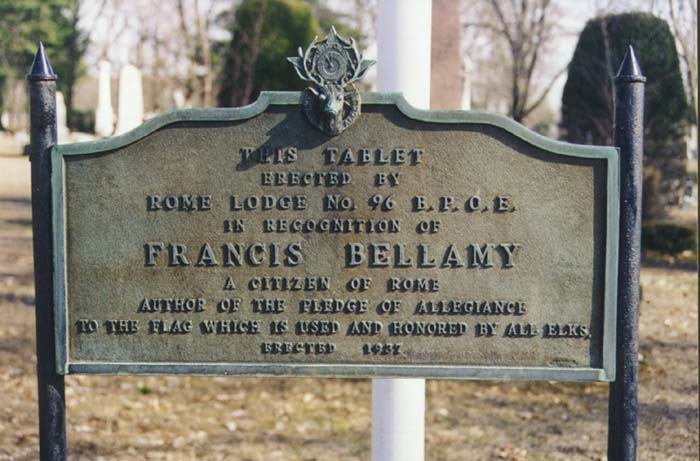
|
and
published it. Pamphlets were sent to schools and millions of
children began reciting it. The original text is: "I pledge
allegiance to my flag and the Republic for which it stand--One nation
indivisible--with liberty and justice for all."
Fifty years later, in 1942, the U.S. Congress
recognized the Pledge. A year later the Supreme Court ruled in
its Gobitis (310 US 586) decision that school children could not be forced
to recite the Pledge as part of their school day routine.
During the heat of the Cold War, when America was
fighting communism and its "atheistic-based" principles, Congress elected
to include in 1954 the phrase "under God" as a symbolic wall separating
the two ideologies.
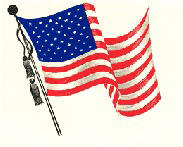 |
The official Pledge of Allegiance today as set in
the US Code, at 36 USC 172, reads: "I pledge allegiance to the
Flag of the United States of America, and to the Republic for which it
stands, one Nation under God, indivisible, with liberty and justice for
all."
The issue at hand is fundamental. Our
Constitution and the Bill of Rights construct a series of protections for
protections for individuals who don't agree with the status quo.
Two of the most difficult to interpret include the Establishment Clause
and the Free Exercise Clause in the First Amendment.
The Establishment Clause says:
Congress shall make no law respecting an establishment of religion..."
This is what the Ninth Court of Appeals ruled on. It protects a
citizen from being "forced" by edict to participate in any religious
format if one wishes not to. It was originally intended to
keep the United States from providing a "state religion," as so many
nations forced upon their people. It also opened the door for the
"right of diversity," including those who don't believe, such as the
emergency room doctor who filed the suit in behalf of his daughter.
But there is a rub. It's called
the Free Expression Clause, and it follows the Establishment Clause.
It says: "...or prohibiting the free exercise thereof;..."
The Establishment Clause promotes the
right to exercise one's religious beliefs, and denies the right of
government to stop that expression. The two clauses protect
the rights of those who wish not to participate in religious expression,
as well as those who do.
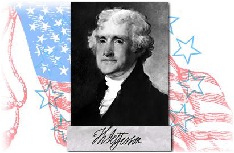 |
Thomas Jefferson called this the
"wall of separation," providing an obstacle between government and
religion. He said it was a "porous wall," one able to shift with the
times, as the intent was never to deny religion but rather to provide it
sanctuary from oppression--either for or against its existence.
Over the years, countless cases have
been brought to test the "wall of separation" in many different forms.
For those interested in reviewing the chronology of U.S. Supreme Court
cases involving this fragile relationship between state and religion, the
following link will provide you a history and reference far more complete
than anything I can offer. It takes you to the First Amendment
Cyber-Tribune and provides a thorough history of Supreme Court cases
regarding religious freedom.
http://w3.trib.com/FACT/1st.religion.html
Back in time, on Dec. 15, 1791 when the Bill of
Rights was ratified (incidentally, September 25, 1791 is considered the
anniversary date of the Bill of Rights because that was the day on which
Congressional approval was completed), it was considered a "leap of faith"
for a nation to provide its people with the ultimate freedoms of religion
and speech. At the time, the Bill of Rights was an
anti-Terrorism tool, demanded by the people who read the Constitution and
felt it lacked protection of individual rights. The uproar
that followed forced the framers of the Constitution to draft the Bill of
Rights and protect the citizens from America evolving into a Terror state
where a person's Voice or beliefs were muffled by laws of the land.
Today, we face another state of oppression and
tyranny. That state of tyranny regards "to whom" do we pledge
our allegiance?
In 1954 Congress felt that "God" represented a
solution. The two great freedoms--religion and speech--were
certainly granted by some force or power greater than anyone could
imagine. No nation prior to the formation of the United States
in 1776, had proven it could allow its citizens unalienable rights and
survive. Skeptics throughout the world at the time bet on the
collapse of "democracy," because it couldn't fathom people taking
responsibility for their future.
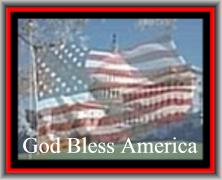 |
The Free Exercise and Establishment Clauses
have survived as the backbone of our democracy, and the current attack on
the words "under God," are mere ants crawling up an elephant's
rump.
But that doesn't mean we shouldn't consider
changing the words, "under God." I propose we do.
My proposal is that the words "under God,"
be changed to "under Vigilance." The Pledge of Allegiance would
read: "I pledge allegiance to the Flag of the United States of
America, and to the Republic for which it stands, one Nation under
Vigilance, indivisible, with liberty and justice for all."
While the word "God" connotes religious
bias for some, for me it represents the idea of a trusting, fair,
protector--a Sentinel of Vigilance--who stands above human frailty and
balances the world so that more good than bad ultimately thrives. In
other words, Vigilance overpowers Terrorism.
Being protected by Vigilance is, in
my opinion, far more digestible to all than God. I don't say
this because of a disbelief in the powers of religion, or to deny religion
a mystical force that promotes the best in human beings. I say
this because "God" has taken many forms over many years, and human beings
have interpreted "God" to represent different things for different
cultures.
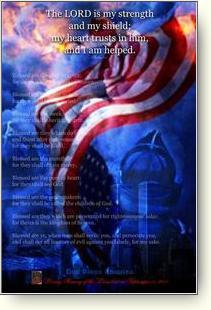 |
Terrorists, for example, believe they are
on a mission "from God" when they blow themselves and others up, or fly
airplanes into World Trade Centers. Holy Wars have been
launched throughout history-- i.e. the Crusades--with God's banner leading
the way. In many lands today, God is defined by the state, as
it was during the communistic reign, denying religious practice. In
some countries such as Central and South America I've seen flags with a
picture of Jesus carrying a machine gun, and followers believing that
God's justice can be meted out through death and destruction
Religion is a private issue, not a
public one. It always has been, and it always will be.
No one can blanket a society with one belief and expect all who fall
within its threads to
 |
adhere to them. That is why the
expression, "under God" should be changed to "under Vigilance."
Vigilance is a non-religious word, but its
impact is similar. Vigilance is about a state of mind that
forces one to concern himself or herself with the welfare of others.
One who stands sentry has the duty to alert others of danger.
Vigilance is about recognizing that we all need to have a sentry, we all
need to be reminded that Terrorism exists in all shapes and sizes, and
only because of a watchful eye can we feel safe and secure.
More importantly, Vigilance is about
protecting the Children's Children's Children from Terrorism.
If we study the meaning of Vigilance, and follow its roots down to
bedrock, we find that Vigilance is about protecting the innocent from
harm. There is nothing more innocent in this world than a child, and
nothing more worthy of dying for than the child's rights to grow into
whomever she or he wishes to become.
But as Citizens of Vigilance, we also have
a duty to instill in a child a sense of unification and duty to others.
The word "Vigilance" offers that. When a child recites the
Pledge of Vigilant Allegiance--"I pledge allegiance to the Flag of the
United States of America, and to the Republic for which it stands, one
Nation under Vigilance, indivisible, with liberty and justice for all."--he
or she is reminded that Vigilance is a composite of Courage, Conviction
and Right Action.
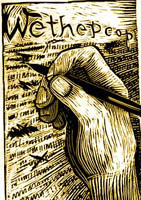 |
This Courage is created to fight a child's Fear,
Conviction to ward off a child's Intimidations, and Right Action to
motivate a child out of a state of Complacency.
Such a Pledge of Vigilant Allegiance also
suggests to a child that his or her parents, and all of the society to
which he or she belongs, is standing "Vigilant" in his or her behalf.
Societies that make the future of their
children the key to their activities and decisions, don't lie and cheat
and steal, robbing the child of a sound economy, or a forceful military to
protect its borders, or a fair and just political and judicial system, or
the rights of the child to express himself or herself freely.
 |
A state of Vigilance by a nation tells a
child he or she is not alone. And, as we all know, the worst
feeling a child can suffer is that of loneliness, disenfranchisement,
alienation.
Children who are taught they are protected
by a State of Vigilance learn the values of Courage are more important
than the deficits of Fear. They learn that their Convictions and the ability to stand
up for them are far more powerful than the Intimidations they might be
victim of; and that Right Action helps them evolve into stronger, more
viable human beings than doing nothing and becoming Complacent that they
are merely a grain of sand on a beach.
"I pledge allegiance to the Flag of the United
States of America, and to the Republic for which it stands, one Nation
under Vigilance, indivisible, with liberty and justice for all."
Ultimately, by changing the word "God"
to "Vigilance" we haven't taken anything away from our Pledge of
Allegiance. We've strengthened it.
Few parents can argue that
Vigilance is bad for their children, or that Vigilance in any way violates
the rights of a child or adult. Who would argue that keeping a
watchful eye on our society and its principles is a detriment, a violation
of the Free Exercise or Establishment Clause?
Terrorism seeks to remove
Vigilance from our lives. For those who see "God" as the
ultimate "Sentinel of Vigilance," after thinking through the benefits of
using the word "Vigilance" will realize that a loving God, a God that
cares for His children--all children--is ultimately a sentry.
He, or She or It, this Higher Power, has but one goal in life--to rid
human beings of Terrorism.
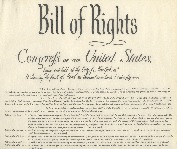 |
Faith, the foundation of all religion, is
the willingness to believe in something one cannot touch, or feel, or
smell or taste. It is the ability to know there is a great
plan for good triumphing over evil, for right to win over wrong, for the
just to command the unjust.
This is all a matter of Vigilance.
It is a matter of belief that one needs to believe that there is more good
than bad in the world, and that forces we may not understand are at work
to help us achieve more Vigilance than Terror in our lives.
I vote for the Pledge of
Vigilance. How about you?
|
THE PLEDGE OF VIGILANT ALLEGIANCE
"I pledge allegiance to the Flag of the
United States of America, and to the Republic for which it stands,
one Nation under Vigilance, indivisible, with liberty and justice
for all." |
Go
To June 26--The Dreadnought Of Vigilance
©2001
- 2004, VigilanceVoice.com, All rights reserved - a ((HYYPE))
design
|
|


